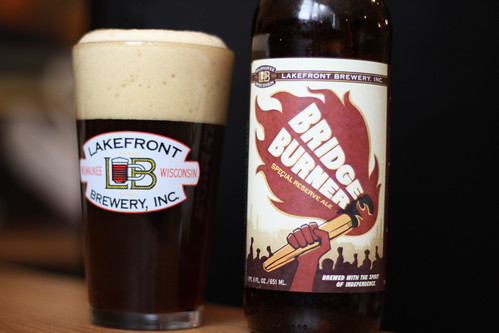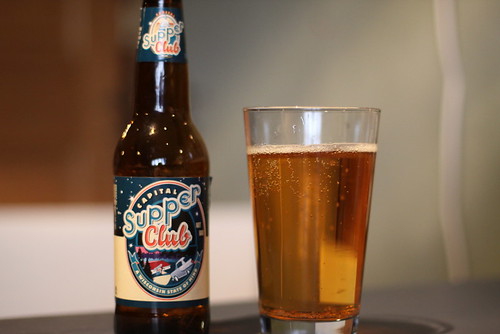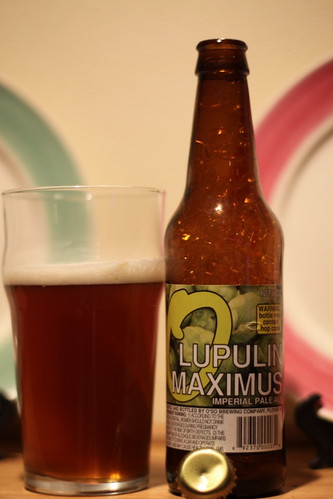This post appears on the twitter #beerclub blog and on the Tosa Patch Beer Club Blog. These sites are here to help beer drinkers learn about their beverages and everything that goes into making them. Because of this, I’m delving a little into the background of the proposals. I am not a lawyer, a brewer, nor am I a journalist. I’m just a guy who loves beer and doesn’t want to see our lawmakers take away the thing I love. Because of my non-expert status I welcome any corrections, clarifications and comments.
The Background
We are living in a golden age in craft beer in America and Wisconsin. The big breweries and their tasteless yellow fizzy beers are losing market share while the artisan craft market is growing by leaps and bounds. In 2010 in the midst of our current economic climate, the overall beer market lost 1% in revenue. At that same time there was a 12% growth in revenue for craft brewers. Craft breweries are making a serious dent in the market share for the yellow fizzy beer producers that have had all the power in the industry for far too long.
Wisconsin has been at the forefront of this beer revolution. There are more than 60 craft breweries in Wisconsin, and three of them are among the 50 largest craft breweries in the country. Wisconsin isn’t in a leadership position in the craft beer world by coincidence. Wisconsin is home to craft beer pioneers who have been brewing since well before craft beer was cool. Not many states have even close to as many well established, long standing craft breweries as we enjoy here. One of the reasons we have such a presence of small breweries is because of the laws we have governing them.
It wasn’t always this way. After Prohibition was repealed with the 21st ammendment, new laws were introduced to change the alcohol culture of the United States, and avoid a repeat of the events running up to prohibition. Chief among these laws was the establishment of the three tier system in an effort to do away with tied houses.
Pre-prohibition there were many “tied houses” which is a fancy way of saying a bar that was tied with a particular brewery. Breweries took advantage of owning the distribution channels and applied pressure to consumers to encourage more drinking. This in turn lead to overindulgence and abuse of the system by many consumers. When prohibition came and went, the government wanted to learn from their mistakes and designed a three tier system to limit the future possibility of these kinds of abuses.
The three tier system mandates that there are three entities that must handle our beverage before we get our hands on it. Under this system a brewer must sell any beer it produces to a distributor and that distributor must sell it to the retail establishment. This limits the brewery’s ability to have a tap room, restaurants, or self distribute. For more details about the three tier system I highly recommend that you watch Beer Wars.
Fortunately for Wisconsin breweries, there have been exemptions to this system. Under current law, a brewery can have ownership in up to two restaurants, hold a wholesaler license, self distribute their product and have a tap room at the brewery. These exemptions open alternate revenue streams and marketing opportunities for breweries that they wouldn’t have otherwise.
The Proposal
Now that I’ve explained a small amount of where we are, let’s get into the details of what’s happening in the state capital. Right now, MillerCoors and some powerful lobbying groups are engaging in a war on the small craft brewers under the guise of writing laws to prevent Anheuser-Busch from buying wholesale distributors in Wisconsin.
Since Anheuser-Busch is such a large brewery, they often make up the majority of one distributor’s stock. They have the money and influence to keep small breweries off of store shelves. MillerCoors and the distributors are afraid that with this money, ABInbev (parent company of Anheuser-Busch) will start buying up distributors so they can be rid of the middle man and make more profits from the sale of their beers.
This particular proposal may or may not be good for beer drinkers, but that’s besides the point. Included in the legislation is a nine page motion that will revoke many of the rights that small breweries rely on to stay competitive against the big brewers.
This legislation was drafted, and passed through the joint finance committee without any input from the public, or the breweries that it would directly affect. Let’s look at some of the limitations that come from this proposed legislation:
- Eliminates the current option of a brewer choosing to self-distribute or starting a Wholesale Distribution Company.
- Eliminates a brewers current right to have ownership in two restaurants.
- Protects (Grandfather Clause) current Wholesalers retail licenses, while eliminating that benefit for new start up Wholesalers.
- Unfairly burdens new Wholesalers and breweries with a requirement of 25 separate independent retail customers before a Wholesale license can be granted.
- Eliminates the ability of Brewers to sell existing retail or wholesale operations separately from the brewing operation.
- Eliminates current Wholesale investment in privately held Wisconsin Breweries while allowing investment in out of state and foreign and publicly traded breweries.
- Moves the power of licensing wholesalers from municipalities to the state level under the jurisdiction of the State Department of Revenue.
- Only wholesalers are allowed to sample beer at retail (on and off premise) establishments, not the breweries. Consequently, the people who know their beer the best cannot do sampling. Furthermore, they are subject to the distributors’ schedule.
These proposals have a direct impact on the bottom line of small breweries. It’s clear that this legislation is designed to limit the growth of small breweries by removing the life lines they rely on. MillerCoors and the distributors are taking advantage of the political climate and making a power grab while they can.
To make matters worse, both of the large breweries at the heart of this legislation are foreign owned companies. SABMiller, parent company of MillerCoors, is headquartered in London, United Kingdon, and ABInbev, parent company of Anheuser-Busch is headquartered in Leuven, Belgium. These two global powerhouses of the brewing industry are crushing Wisconsin based businesses and threatening the artisan industry here in our state.
This legislation has passed the Joint Finance Committee and is now waiting to be tacked onto the full Wisconsin Budget Bill.
The Call To Action
We need to tell Wisconsin lawmakers that we’re not going to let them hurt local Wisconsin entrepreneurs and businesses just so they can help a conglomerate foreign owned brewery crush its competition.
While you could go to Madison and protest this legislation, there are actions you can take from home.
- Ask your favorite bars and restaurants to take down their MillerCoors taps.
- Call or write your state legislators and tell them to stand up for Wisconsin brewers by opposing changes to Chapter 125.
- Call MillerCoors at 1-800-645-5376 and tell them to stop supporting this provision.
- Join the Wisconsin Brewer’s Guild as a Wisconsin Beer Lover.
Let’s show the Wisconsin Legislature that it’s the Fourth Tier that’s the most important, the drinkers!
If you’re still reading this article, you deserve a beer. Go get yourself one and pass this info along to the beer lovers in your life.




Please fill out the petition at http://www.change.org/petitions/support-wisconsin-craft-brewers
Thanks for passing along the petition information I signed it
The Journal Sentinal reported (http://ht.ly/583vj) that breweries brewing 300K barrels or less were allowed to do their own self distribution, which solves one of the bigger issues with the bill, no? I’ve been trying to get informed on this bill, but none of the info from craft brewery supporters touches on that piece of the bill, yet it seems to be the biggest point of defense for supporters of the bill. They’re saying that provision exempts small breweries from the distribution clause and therefore the law is helping to protect both big and small breweries. I’m inclined to support the craft breweries stance, but no one has tried to address that 300K barrel argument yet (at least in anything that I’ve read). Could you clarify please? Thanks!
Christine,
I too have been confused by the wording of this proposal and I think the wording is confusing many people. There is lots of double speak in the proposal. See page 6 where it says the law will:
Repeal the following current law provisions:
A) A brewer that, together with its brewer group, manufactures not more than 50,000 barrels of beer in a calendar year in any location may be issued a wholesaler’s license for wholesale premises located on brewery premises.
B) A brewer that, together with its brewer group, manufactures more
than 50,000 barrels of beer in a calendar year in any location may be issued a wholesaler’s license for wholesale premises located on brewery premises, but may not sell or ship more than a total of 1,000 barrels of beer in any calendar year to retailers from these wholesale premises. Beer provided by a brewer to any retail premises for which the brewer holds the retail license must not be included in any calculation of the 1,000-barrel limitation.
C) etc…
The key word here is “Repeal” with that single phrase at the beginning of this list, the wording of the bill is all positive, and yet it is actually removing those existing rights.
I hope that helps you understand the bill’s provisions.
Mitch
The Journal Sentinel reported (http://ht.ly/583vj) that breweries brewing 300K barrels or less were allowed to do their own self distribution, which solves one of the bigger issues with the bill, no? I’ve been trying to get informed on this bill, but none of the info from craft brewery supporters touches on that piece of the bill, yet it seems to be the biggest point of defense for supporters of the bill. They’re saying that provision exempts small breweries from the distribution clause and therefore the law is helping to protect both big and small breweries. I’m inclined to support the craft breweries stance, but no one has tried to address that 300K barrel argument yet (at least in anything that I’ve read). Could you clarify please? Thanks!
Pingback: Yellow, Fizzy, and Tasteless: Further Analysis of the Brewing War | Twitter Beerclub
Pingback: This Bud’s Not For You « scribblesabit